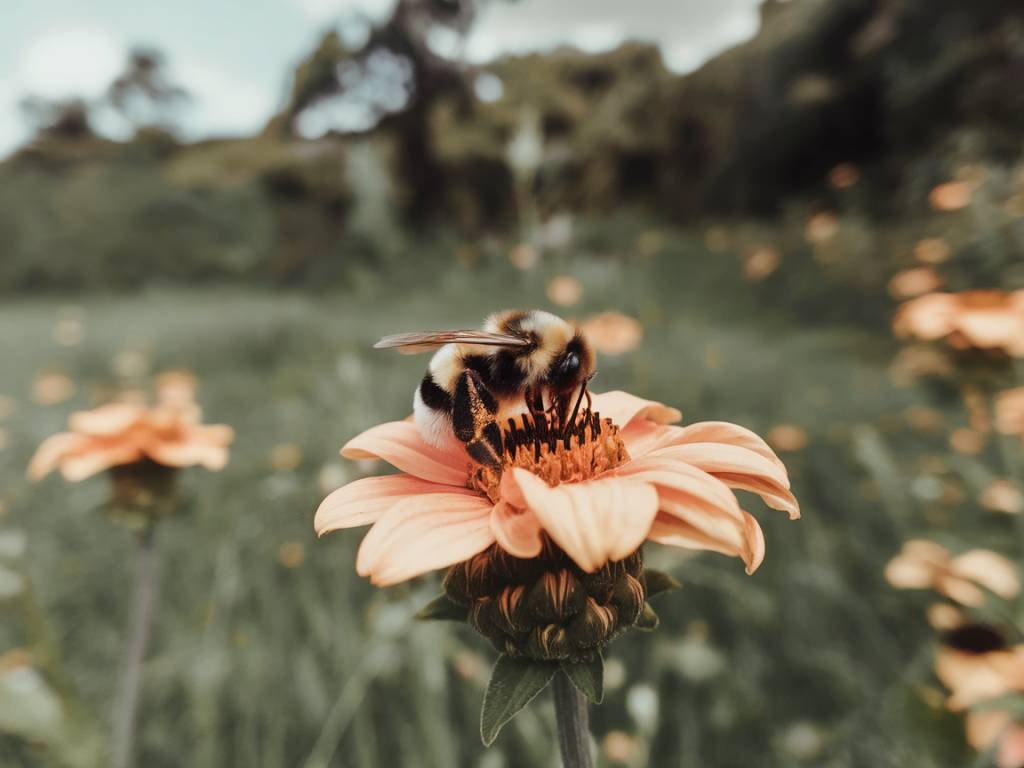The Buzz Around Pollinators: An Essential Asset for Ecosystem Health
Imagine a world without the sweet scent of blooming flowers, without the vibrant colors of meadows buzzing with life. This might sound like a dystopian movie, yet it’s a reality we could face if pollinators continue to decline at their current rate. Pollinators like bees, butterflies, and birds play an extraordinary role in maintaining the health of our ecosystems. Their tireless labor is indispensable, yet often undervalued, in supporting biodiversity and ensuring food security.
A Symphony of Species: The Diversity of Pollinators
When we think of pollinators, bees are usually the first to spring to mind. However, they are but a piece of a larger, intricate tapestry. Butterflies, moths, birds, bats, and even beetles participate in this delicate dance of nature. Each species contributes uniquely to pollination processes. For instance, hummingbirds favor tubular flowers, while bats pollinate night-blooming plants. This rich variety ensures a wide range of plant species can be fertilized and thrive.
With over 20,000 species of bees alone, each adapted to different ecological niches, the symbiotic relationships between plants and pollinators are as complex as they are fascinating. Can we afford to lose such biodiversity?
The Crucial Link: Pollinators and Food Security
Pollinators are key players in our food systems. According to estimates from the Food and Agriculture Organization (FAO), approximately 75% of the world’s crops depend, at least in part, on pollination. Fruits, vegetables, nuts—these and many more directly benefit from the work of our winged allies.
Imagine biting into a crisp apple, savoring the sweetness of a juicy mango, or indulging in rich flavors of chocolate. All these delights, along with countless others, owe their existence to the intricate job performed by pollinators. Without them, our plates would look less colorful and less nutritious. Can we leave our food security up to chance?
Beyond the Fields: Ecosystem Services Provided by Pollinators
Their role extends beyond the realm of agriculture. Healthy ecosystems depend on pollinators to reproduce, supporting plant diversity that fuels entire food webs. By helping 90% of flowering plant species reproduce, these small creatures ensure the survival of habitats that numerous animals rely on for food and shelter.
The intricacies of these networks mean that the decline of pollinators could lead to unforeseen consequences cascading through the food chain. It’s the butterfly effect at its most literal: tiny wings causing ripples through entire ecosystems.
Threats and Challenges: Why Are Pollinators Disappearing?
Despite their importance, pollinators are under threat. Habitat loss, pesticide use, climate change, and diseases are decimating their populations. Imagine navigating an obstacle course filled with pitfalls—our modern landscapes present similar challenges for pollinators.
Climate change, in particular, disturbs synchronies established over millennia. As temperatures rise and seasons shift, flowers bloom at different times, leaving pollinators with fewer resources to feed on. Similarly, pesticide exposure can impair their navigation and foraging abilities, akin to a runner with blurred vision and erratic stamina.
What Can We Do: Steps for Sustaining Pollinator Populations
Supporting pollinators requires efforts at all levels, from backyard actions to global policies. Here are some practices to consider:
- Plant native flowers that provide ample nectar and pollen.
- Create bee hotels by leaving patches of bare soil for ground-nesting bees.
- Reduce or eliminate pesticide use by opting for organic, eco-friendly alternatives.
- Support local and sustainable farms that follow pollinator-friendly practices.
- Participate in citizen science projects to monitor pollinator health and trends.
These actions, however small they may seem, collectively forge corridors of support, enabling pollinators to thrive in an increasingly challenging world.
A Collective Mission: Why Pollinator Protection Is a Shared Responsibility
In the end, securing a future abundant with nature’s diversity is a shared responsibility—one that transcends cultural and geographical boundaries. By protecting pollinators, we’re not only safeguarding our food systems but also committing to a richer, more stable biosphere.
Will future generations inherit a world where the vibrant hum of pollinators can still be heard? The answer depends on the choices we make today. Engaging in their preservation isn’t just an ecological necessity; it’s a profound expression of respect for the planet we all call home.

